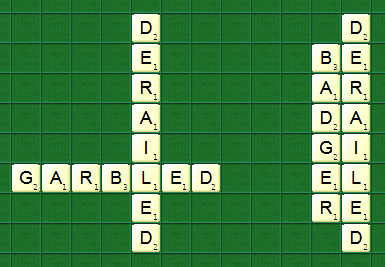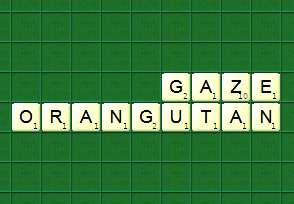Two Letter Words
Personally, I enjoy playing Scrabble - it is an excellent game. There is a slight problem with it though - it manages to straddle the gulf between language, which is highly flexible, ever changing and more than a little subjective, and competition, which
Personally, I enjoy playing Scrabble - it is an excellent game. There is a slight problem with it though - it manages to straddle the gulf between language, which is highly flexible, ever changing and more than a little subjective, and competition, which leads people to seek to optimise heavily, bending into unrecognisability any rules that are not laid down in cast iron.
This split personality leads to conflicts, the most obvious one being which dictionary to use. This particular conflict has been neatly resolved in the English language by everyone agreeing to use "Collins Scrabble Words" (CSW, previously known as SOWPODS). Oh wait, that isn't the case at all - the US, Canada and Thailand use the "Tournament Word List (TWL, derived from Merriam-Webster). Be that as it may, I am going to talk about CSW/SOWPODS here, because I am in the UK.
The Scrabble conflict I am most familiar with is the one that arises between serious players and occasional players. By serious, I don't mean people that compete at an international level or anything like that; I just mean people that are competitive - the aforementioned optimisers. It is possible to deduce fairly quickly that knowing all permissible 2-letter words gives you a huge advantage over anyone that doesn't - being able to play words parallel rather than perpendicular to those already on the board increases the availability of high scoring plays enormously. For example, if DERAILED is already on the board, we can play the hand ABEGKDR in a couple of very different ways. Before any bonuses are taken into account, playing letters parallel to the existing word already scores more than double playing them perpendicular:
This means that anyone looking for an edge in the competition is very likely to seek out a list of all permissable 2-letter words, and learn them. House rules aside, the default ruleset is to use the official Scrabble competition dictionariy. In TWL there are 107, and in SOWPODS there were 124 until 3 more were added in 2019, bringing the total to 127. A list of 127 words is fairly manageable to learn, but the real problem comes when trying to actually use them in a game. An "occasional player" may agree to use the default official dictionary, as this sounds like a reasonable thing to do, but when you, for example, make the following play:
With the Z on a triple letter score, netting you 72 points in a single turn… People are going to ask you what "gu" and "za" mean.
Of course, neither is in the dictionary you have to hand, so you check online, assuring everyone that they are totally valid words in competition Scrabble. Of course, any SOWPODS lookup website will tell you that both are perfectly valid words, but most of these will not give you the definition. You then go on an ordinary dictionary website, which informs you that GU is an abbreviation for both genitourinary and Guam, while 'za is a slang abbreviation for pizza. You feel the mood of the table turning against you, as people start grumbling that abbreviations are explicitly forbidden in the rules of Scrabble, and whilst slang that is widespread and has been around for a long time might make it into the dictionary, 'za definitely seems to be reaching a bit.
Undeterred, you find a SOWPODS website that seems to include definitions, and you look up the two words. Disaster strikes - you get the same definitions again! Much "lively discussion" ensues, and perhaps people settle down and agree not to worry, as such a high score was a bit of a fluke anyway. The trouble is, it wasn't a fluke, so the next time you make a high scoring play that relies on the two letter word FE, it comes to a head yet again. You look it up, and the online dictionary says that it is the chemical symbol for iron - not a valid definition for Scrabble purposes. This is the last straw, and everyone revolts - no more SOWPODS words! They're not proper words, it gives you an unfair advantage, and it's a silly name for a dictionary anyway - let's all agree to be reasonable and use the OED from now on. Memorising the 2-letter words was a waste, and everyone now thinks you're basically a cheat.
Well, it doesn't have to be this way. All of the 2-letter words in SOWPODS are indeed actual words that have definitions that are not abbreviations. All of these definitions are also possible to find online if you look hard enough, but unfortunately they're not in the first places you look. These definitions fall into what I consider to be 5 broad categories, each of which contains around 20 words. In an effort to make both the words and their meanings easier to memorise, I shall run through the 2-letter words by category:
Interjections (24)
A class of words like nouns or verbs, except that these are simply noises that express emotion.
WordDefinitionRecent Addition?In TWL?AHExpressing surpriseAWExpressing affection or disappointmentBOExclamation to inspire surpriseEHExpressing confusionERExpressing uncertaintyEWExpressing disgust2019FYExpressing contemptNoHAExpressing amusementHIGreetingHMExpressing being in thoughtHOExpressing amusementIOExpressing triumphNoLODirecting attention to some subject of interestMMExpressing satisfactionOHExpressing surpriseOIRequesting attentionOWExpressing being in painOYRequesting attentionSHRequesting silenceSTExpressing displeasureNoUHExpressing confusionUMExpressing uncertaintyURExpressing uncertaintyNoYOGreeting
Letters (22)
Every letter has a name, and that name is a perfectly valid noun.
WordDefinitionRecent Addition?In TWL?ARThe letter REFThe letter FELThe letter LEMThe letter MENThe letter NESThe letter SEXThe letter XFA4th tone of the solfège musical scaleFEHebrew letter (Pe without a dot in the centre)2006LA6th tone of the solfège musical scaleMI3rd tone of the solfège musical scaleMUGreek letterNUGreek letterPEHebrew letterPIGreek letterRE2nd tone of the solfège musical scaleSI7th tone of the solfège musical scale (alternative to Ti)TE7th tone of the solfège musical scale (alternative to Ti)TI7th tone of the solfège musical scaleUT1st tone of the solfège musical scale (alternative to Do)XIGreek letterZAArabic letter2006
Common Words (24)
These are the really obvious ones; some of the most frequently used words in the language, which explains why they are so short.
WordDefinitionRecent Addition?In TWL?AMForm of beANIndefinite articleASTo the extent ofATPrepositionBETo existBYPrepositionDOTo executeGOTo move alongHEPronounIFConjunctionINPrepositionISForm of beITPronounMEPronounMYPronounNONegative responseOFPrepositionONPrepositionORConjunctionSOTo a great degreeTOPrepositionUPToward the skyUSPronounWEPronoun
Ordinary Words (22)
These are words that are in fairly regular usage among certain professions or groups of people, but that are often used more broadly. Not particularly niche, but there are plenty of people that will hardly ever use them, even if they have come across them. This category contains a few abbreviations that have entered the vernacular.
WordDefinitionRecent Addition?In TWL?ABAbdominal muscleADAdvertisementAGAgriculturalAXAxeBIBisexualEDEducationIDPart of the PsycheMAMotherMOA momentNEBorn with the name ofOBObservationNoOKAcceptable/affirmative2019OPOperationOSBone (usually in a medical context)OXA cow or bullPAFatherTAThanksUGTo dreadNoUNOneWOWoeYAPronoun - youZEPronoun - Gender neutral third person singular2019No
Dialect Words (15)
These are words from a particular dialect of English. They will be very unfamiliar to most people that do not have contact with people that speak the dialect.
WordDefinitionRecent Addition?In TWL?AEScots - oneAYScots - yes (also aye)CHDialect - INoDEDialect - theEADialect - a riverNoEEScots - eye (plural een)NoETDialect - past tense form of eatJADialect - yes2006NoJOScots - sweetheartKYScots - cattleNoNAScots - No; NotNYArchaic - nigh; nearNoOEScots - grandchild (also oy, oye)OUSouth Africa - blokeNoYEDialect - Pronoun - you
Obscure Words (20)
These are very niche words, often borrowed from other languages for a specific purpose.
WordDefinitionRecent Addition?In TWL?AARough, cindery basaltic lavaAIA species of three-toed slothALThe Indian mulberry (also spelled Aal)BAThe soul in Egyptian mythologyDAA heavy Burmese knife (also spelled Dah)DIDei (plural of deus)NoGIPiece of clothing used in jiu jitsu, karate and judoGUA simple violin used in Shetland (also spelled Gue)NoKAThe vital essence in Egyptian mythologyKIAlternate spelling of Qi2006KOA type of play in the game of GoNoLIChinese unit of distanceODA mystic universal life forceOMA syllable intoned as part of a mantraOOHawaiian bird of the genus MohoNoPOA chamber potQIA Chinese life forceXUMonetary unit of Vietnam, one hundredth of a dongYUType of jadeNoZOTibetan breed of cattle (also spelled Dzo)No
With this, if you can remember all of the definitions as well as the words themselves, you should be able to avoid the scenario above.
Bonus
The next most useful thing for Scrabble that is fairly easy to learn, is probably the list of words that contain a Q but not U. Here are all of the 3, 4 and 5 letter words that fit this criterion, along with their definitions:
QATLeaves of the shrub Catha edulis, chewed as a stimulantQISPlural of qiQADIIslamic judgeQAIDNorth African Muslim tribal chiefQATSPlural of qatQOPHHebrew letterWAQFA donation of property to charityFAQIRMuslim or Hindu begging monkNIQABVeil covering the face below the eyesQADISPlural of qadiQAIDSPlural of qaidQANATUnderground irrigation canalQIBLAThe direction towards Mecca, which praying Muslims faceQOPHSPlural of qophQORMAType of curry (alternative spelling of korma)TALAQA type of Islamic divorceTRANQSlang for tranquilizerWAQFSPlural of waqf


